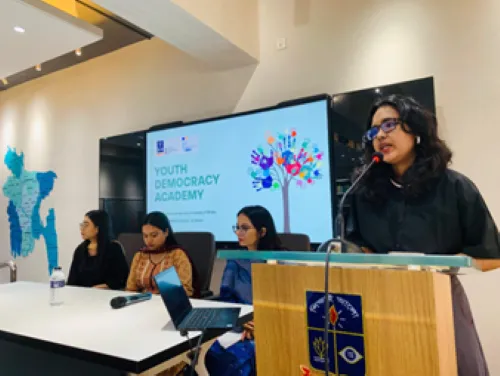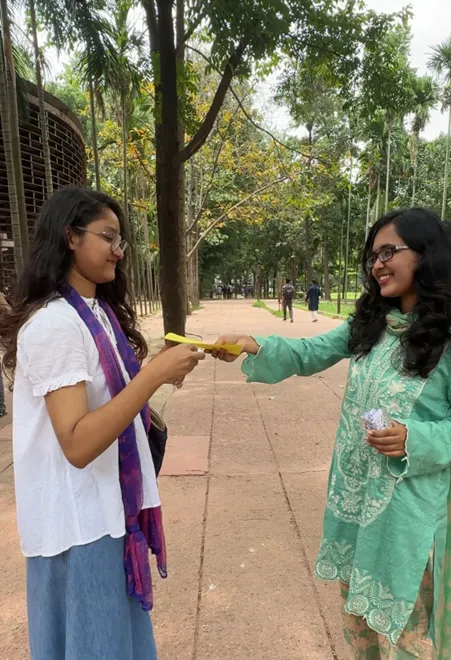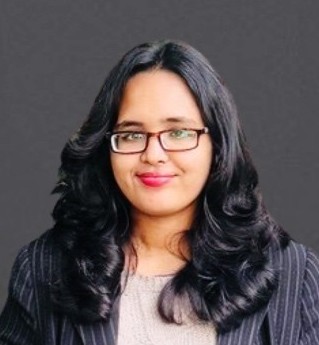From learning to leading: My Youth Democracy Academy journey in Bangladesh

The Youth Democracy Academy (YDA), hosted by the Applied Democracy Lab (ADL), University of Dhaka, in collaboration with International IDEA, reshaped my perception of democracy from a subject in textbooks into something alive, dynamic, and deeply personal. As a student of sociology, I had long explored social structures and political systems. Yet, it was through YDA that I came to understand democracy not just as an electoral system but as a lived experience that demands constant participation and reflection.
Foundation and learning: A shift in understanding
Spanning a combination of online lectures and in-person workshops, the Youth Democracy Academy offered a multidimensional curriculum covering the functioning of electoral systems, the role of political parties, the power of an informed citizenry, and the importance of an independent judiciary. But what made the experience truly transformative was how it intertwined theory with practice. More than just classroom knowledge, YDA sharpened my public speaking skills, encouraged critical dialogue, and taught me to see democratic participation as a personal responsibility. The academy challenged me to move beyond passive learning and apply what I had gained to my community to help bridge the gap between civic knowledge and civic engagement.
From learning to leading: Nagarik Alapon
The spark lit by the Youth Democracy Academy led to the creation of my action project: Nagarik Alapon: Igniting Civic Awareness. I launched this initiative with a simple yet urgent goal to address the growing disconnect among young people between knowing their rights and practicing them. Too many peers around me knew the word ‘democracy’ but had never engaged with it meaningfully. Some admitted they were unaware of basic legal rights, like those outlined in the Rights of Persons with Disabilities Act. Others expressed apathy, with statements like, “Voting doesn’t matter.” Nagarik Alapon was born as a response, a space where civic learning could be human, interactive, and emotionally resonant.
I wanted to move away from formal lectures and create an experience where learning felt like a conversation, not a class. So I designed a ‘Question-Answer-Reward’ model. Through a series of interactive quizzes, debates, and rights-based discussions, participants explored civic responsibilities in formats that were both engaging and reflective. Over 100 fact sheets were distributed to aid their understanding of relevant laws and democratic structures. But what made Nagarik Alapon truly unique were the little things, flowers and chocolates handed out as symbolic rewards. These were not just tokens; they were tools to create emotional connection. One participant later told me, “The flower made me feel encouraged to learn!” That emotional spark was what I had hoped to ignite —a feeling that civic learning could be kind, joyful, and meaningful.
Real impact: Transforming attitudes, not just awareness
The outcomes went beyond what I imagined. I directly engaged 50 students and reached over 2,000 impressions through social media, using the hashtag #NagarikAlapon across 15 campaign posts. More importantly, 70 per cent of participants reported learning about a new civic right. Some pledged to register to vote for the first time. Others said they would begin engaging in local civic matters with more confidence. Yes, challenges arose, venue distractions, for instance, but the overwhelmingly positive response reminded me that emotional and cognitive engagement can overcome even structural hurdles.
Nagarik Alapon was more than just a project; it was a reflection of the YDA’s empowering methodology.
The framework provided by ADL and International IDEA equipped me with not only knowledge but also the confidence and strategic thinking to turn theory into tangible action. It validated a crucial lesson: meaningful civic education, when rooted in emotional resonance and community relevance, can create lasting change.
A call to youth action
My journey from student to civic educator reaffirmed something profound: democracy cannot survive on institutions alone; it requires active, aware, and emotionally connected citizens. As young people, we cannot afford to stay on the sidelines. We must create spaces where democracy is not just spoken about, but felt and practiced. The future is not something we inherit. It is something we shape.
Through my YDA journey, I learned that even a small initiative, if fueled by purpose and compassion, can light the path toward a more engaged, democratic society. I urge young people to engage with the Youth Democracy Academy and take up civic action because real change begins when we understand our rights and use our voices to shape a more just and democratic society.
The Youth Democracy Academy left me with a renewed commitment to civic action. It reminded me that while building democratic awareness may be difficult, it is a journey worth pursuing, one where every question sparks curiosity, and every conversation brings us closer to a more informed, engaged society.





